Oprah's No Texting Campaign

Millions of people text, talk or e-mail on their cell phones while driving—a recent survey finds that 71 percent of people between the ages of 18 and 49 admit they text or talk on the phone while they drive.
If you think you can call, text and drive at the same time, you cannot. That message you can't wait to send could kill. Distracted driving is an epidemic that is sweeping through our country, claiming lives and destroying families.
Oprah's message for you
In September 2008, a Los Angeles commuter train conductor missed a red light while sending and receiving more than 40 text messages. His packed train collided head-on with a freight train, injuring 135 people. The conductor and 24 others were killed, making it the second worst commuter train crash in U.S. history.
Weeks later, a school bus carrying 21 students was rear-ended by an 18-wheel semitruck. The bus was pushed more than 200 feet before bursting into flames. Twenty students escaped, but 13-year-old Margay Schee was killed. The truck driver admitted he had been texting and hadn't seen that the bus was stopped.
These accidents made national headlines, but so many others have been killed in communities just like yours. Nearly 500,000 people are injured and 6,000 are killed each year because drivers are talking, texting and e-mailing behind the wheel. "It is my prayer that this show, this day will be a seminal day in your life," Oprah says. "Let it be the end, the end of you using a cell phone or sending a text message when you are behind the wheel of a moving vehicle. And until we as a nation decide we're going to change that, those numbers are only going to go up."
Sign Oprah's No Phone Zone Pledge
If you think you can call, text and drive at the same time, you cannot. That message you can't wait to send could kill. Distracted driving is an epidemic that is sweeping through our country, claiming lives and destroying families.
Oprah's message for you
In September 2008, a Los Angeles commuter train conductor missed a red light while sending and receiving more than 40 text messages. His packed train collided head-on with a freight train, injuring 135 people. The conductor and 24 others were killed, making it the second worst commuter train crash in U.S. history.
Weeks later, a school bus carrying 21 students was rear-ended by an 18-wheel semitruck. The bus was pushed more than 200 feet before bursting into flames. Twenty students escaped, but 13-year-old Margay Schee was killed. The truck driver admitted he had been texting and hadn't seen that the bus was stopped.
These accidents made national headlines, but so many others have been killed in communities just like yours. Nearly 500,000 people are injured and 6,000 are killed each year because drivers are talking, texting and e-mailing behind the wheel. "It is my prayer that this show, this day will be a seminal day in your life," Oprah says. "Let it be the end, the end of you using a cell phone or sending a text message when you are behind the wheel of a moving vehicle. And until we as a nation decide we're going to change that, those numbers are only going to go up."
Sign Oprah's No Phone Zone Pledge

In November 2008, Shelly and her husband, Daren, were the happily married parents of three beautiful girls, 13-year-old Jessica, 9-year-old Erica and 4-year-old Valerie. "Erica is my little sunshine because she lit up the house," she says. "She was making us laugh before she was a year old."
Two days before Thanksgiving, Shelly came back from a doctor's appointment to find emergency crews on her street. "There were all these people and a child lying on the ground," she says. "I had no idea it was my daughter."
Shelly remembers that tragic day
Daren says Erica was riding her bike home from school. "Erica was just around the corner from our house," he says. "She was 30 seconds from being home safely."
Erica had been hit head-on by a 5,000-pound SUV. Police say that the driver had recently finished a phone call at the time of the accident. "The driver said: 'I'm so sorry. I didn't see her,'" Shelly says. "I felt badly for the driver because I thought: 'Oh, she's unconscious. She's going to be okay.' ... And they started cutting my daughter's clothes off and it was hitting me this is very, very, very serious."
Erica was rushed to the local children's hospital, then airlifted to another facility. "The neurosurgeon made it very clear she was going to die," Shelly says. "I spent the night with her that night. I held her. Cried. I kissed her. I sang to her. I just needed to have time with my girl."
Two days before Thanksgiving, Shelly came back from a doctor's appointment to find emergency crews on her street. "There were all these people and a child lying on the ground," she says. "I had no idea it was my daughter."
Shelly remembers that tragic day
Daren says Erica was riding her bike home from school. "Erica was just around the corner from our house," he says. "She was 30 seconds from being home safely."
Erica had been hit head-on by a 5,000-pound SUV. Police say that the driver had recently finished a phone call at the time of the accident. "The driver said: 'I'm so sorry. I didn't see her,'" Shelly says. "I felt badly for the driver because I thought: 'Oh, she's unconscious. She's going to be okay.' ... And they started cutting my daughter's clothes off and it was hitting me this is very, very, very serious."
Erica was rushed to the local children's hospital, then airlifted to another facility. "The neurosurgeon made it very clear she was going to die," Shelly says. "I spent the night with her that night. I held her. Cried. I kissed her. I sang to her. I just needed to have time with my girl."
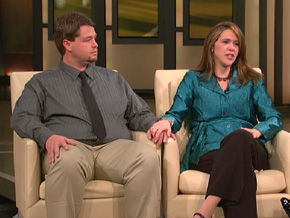
Since Erica's death, Shelly and Daren have been working to change the laws in Colorado. "I don't want any other parent to have to go through this, or a husband to lose his wife," she says. "We have been trying so hard to get this law changed, and we're going to continue until it happens."
In the meantime, Shelly and Daren say every single person who gets behind the wheel can make a difference. "Get off the phone. Save a life. Don't talk and drive," she says. "You've got precious cargo in that car. Your life. Your children's life. They are not worth a phone call, a text, an e-mail. It's not worth it."
In the meantime, Shelly and Daren say every single person who gets behind the wheel can make a difference. "Get off the phone. Save a life. Don't talk and drive," she says. "You've got precious cargo in that car. Your life. Your children's life. They are not worth a phone call, a text, an e-mail. It's not worth it."
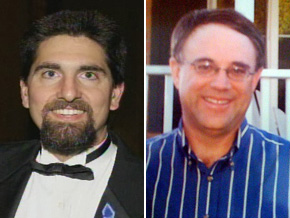
Most European countries ban the use of handheld cell phones while driving, but not all U.S. states have laws restricting texting and driving. So far, 19 states and the District of Columbia have banned texting while driving. In seven states and the District of Columbia, drivers can only use their cell phones if they are hands-free. Of the states with these laws, Utah's laws are among the strictest, due to one distracted driver and two grieving families.
September 22, 2006, began like any other day for Jackie Furfaro. She kissed her husband, Jim, goodbye as he left to pick up his colleague, Keith O'Dell, for work. A few hours later, Jackie arrived at work, where police were waiting for her. They told her Jim had been in an accident. "I saw Jim's license in the hands of one of the police officers, and I realized that he was dead," she says.
"They told me that a 19-year-old who was driving a white Tahoe had crossed the center line and clipped my husband," she says. "He ended up in the oncoming traffic line and was broadsided by the vehicle behind the 19-year-old, and he was killed instantly, along with Keith."
An investigator at the crash site suspected texting was involved when he saw the 19-year-old, Reggie Shaw, texting on the way to a mandatory drug and alcohol screening. No drugs or alcohol were found in his system, but cell phone records confirmed Reggie had been texting from the time he got into his car up until the moment of the crash.
September 22, 2006, began like any other day for Jackie Furfaro. She kissed her husband, Jim, goodbye as he left to pick up his colleague, Keith O'Dell, for work. A few hours later, Jackie arrived at work, where police were waiting for her. They told her Jim had been in an accident. "I saw Jim's license in the hands of one of the police officers, and I realized that he was dead," she says.
"They told me that a 19-year-old who was driving a white Tahoe had crossed the center line and clipped my husband," she says. "He ended up in the oncoming traffic line and was broadsided by the vehicle behind the 19-year-old, and he was killed instantly, along with Keith."
An investigator at the crash site suspected texting was involved when he saw the 19-year-old, Reggie Shaw, texting on the way to a mandatory drug and alcohol screening. No drugs or alcohol were found in his system, but cell phone records confirmed Reggie had been texting from the time he got into his car up until the moment of the crash.
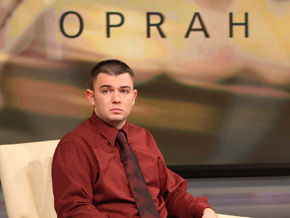
Reggie was sentenced to 30 days in jail, community service and to honor a unique request from Jackie—to watch a video of her husband's funeral. "I just wanted him to know who he killed," she says. "That was a way for him to get to know one of the men."
Before the accident, Reggie says he texted "pretty close to 100 percent of the time" while driving. "I just never thought about it," he says. "Growing up, going to high school, going to driver's ed, it was never taught to me how dangerous it was."
Reggie says he's haunted by what he's done. "This affects my life every day. It's something that I can never really forgive myself for. It was a poor choice that I made," he says. "I have trouble sleeping at night. You drive down the road, you see accidents on the side of the road, and instantly that's the first thing that I think of. It's hard every day. It never gets easier."
Before the accident, Reggie says he texted "pretty close to 100 percent of the time" while driving. "I just never thought about it," he says. "Growing up, going to high school, going to driver's ed, it was never taught to me how dangerous it was."
Reggie says he's haunted by what he's done. "This affects my life every day. It's something that I can never really forgive myself for. It was a poor choice that I made," he says. "I have trouble sleeping at night. You drive down the road, you see accidents on the side of the road, and instantly that's the first thing that I think of. It's hard every day. It never gets easier."
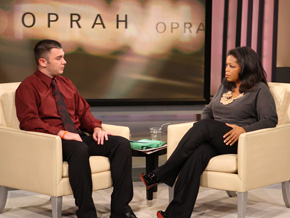
When asked whether the jail time he served was enough, Reggie says he doesn't know. "I think about those 30 days in jail and what I went through and how hard that was for me—and I think about the two lives that are lost," he says. "I don't know if it was enough."
Still, Reggie says it's important for him to share his story with others. In fall 2008, Reggie spoke at a national summit in Washington, D.C., about the dangers of distracted driving. He also speaks at high schools to give students the warning he never received. "A lot of them think along the lines like I thought: 'I can do this. I'm safe,'" he says. "I explain to them: 'It's not safe. Absolutely not. Look what it's done to me. Look what it's done to these two families. You don't want to put anyone through that. It's not worth it.'"
Still, Reggie says it's important for him to share his story with others. In fall 2008, Reggie spoke at a national summit in Washington, D.C., about the dangers of distracted driving. He also speaks at high schools to give students the warning he never received. "A lot of them think along the lines like I thought: 'I can do this. I'm safe,'" he says. "I explain to them: 'It's not safe. Absolutely not. Look what it's done to me. Look what it's done to these two families. You don't want to put anyone through that. It's not worth it.'"
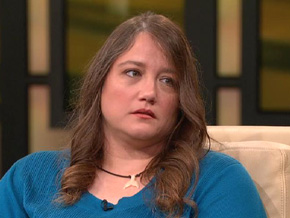
In the aftermath of the crash, Utah enacted some of the toughest texting and driving laws in the nation. Jackie credits Reggie with helping get those laws passed so quickly. "[Victim advocate] Terryl Warner was there when he went and spoke with the legislature," Jackie says. "She basically said that it was what Reggie said and his actions that got them to pass the law."
Despite the pain he's caused her family, Jackie says she has forgiven Reggie. "I realize that he was truly sorry and he's accepted his punishment," she says. "He's even gone above and beyond what was asked of him in some cases."
Despite the pain he's caused her family, Jackie says she has forgiven Reggie. "I realize that he was truly sorry and he's accepted his punishment," she says. "He's even gone above and beyond what was asked of him in some cases."

Linda Doyle was a beloved wife, mother and grandmother. On September 3, 2008, the 61-year-old was killed after a 20-year-old driver ran a red light and T-boned her car going 45 to 50 miles per hour. "He didn't see the light," says Jennifer, Linda's daughter. "The news reports that night, the newspapers the next day said he was engrossed in a cell phone conversation."
Jennifer opens up about the accident
Jennifer says she was stunned after seeing the wreckage of her mother's car. "When I saw the seat she was sitting in, that was the hardest part for me," she says. "Put your mother, your wife, your son, your daughter, your grandparents, your friend in that seat that my mother was sitting in and you tell me, is that phone call worth it?"
Jennifer opens up about the accident
Jennifer says she was stunned after seeing the wreckage of her mother's car. "When I saw the seat she was sitting in, that was the hardest part for me," she says. "Put your mother, your wife, your son, your daughter, your grandparents, your friend in that seat that my mother was sitting in and you tell me, is that phone call worth it?"
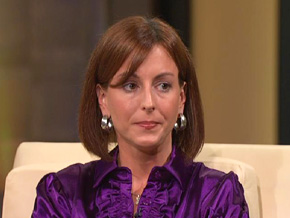
Before her mother's accident, Jennifer says she used her car as an office. "I didn't text. That was something I knew I couldn't do. But I was on the phone," she says. "I was just under the same misconception as everyone else that if you've got that headset in your ear, you're okay."
Jennifer wants people to know having a headset won't protect you. "The man driving that car that hit my mother was driving for less than a quarter of a mile. He was on the phone for less than a minute. He couldn't do it. His brain couldn't handle it," she says. "It's not where your hands are. It's where your head is."
Sign Oprah's No Phone Zone Pledge
Watch this entire episode now
Families remember loved ones lost to distracted driving
What you really see when you're texting
Jennifer wants people to know having a headset won't protect you. "The man driving that car that hit my mother was driving for less than a quarter of a mile. He was on the phone for less than a minute. He couldn't do it. His brain couldn't handle it," she says. "It's not where your hands are. It's where your head is."
Sign Oprah's No Phone Zone Pledge
Watch this entire episode now
Families remember loved ones lost to distracted driving
What you really see when you're texting



